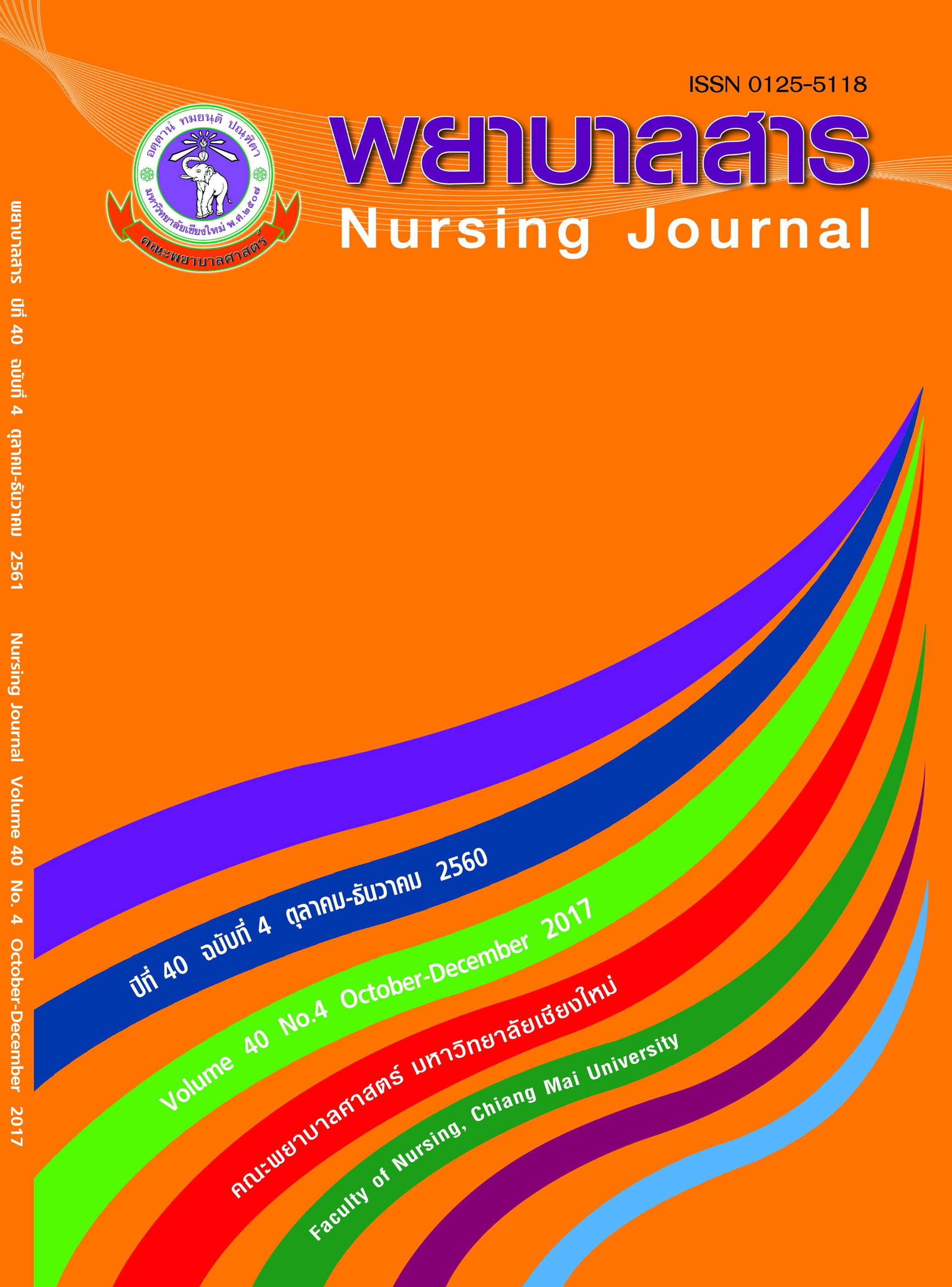Perceived Organizational Support and Proactive Work Behavior Among Registered Nurses
Keywords:
Perceived organizational support, proactive work behavior, registered NursesAbstract
It is widely recognized that perceived organizational support have favorable outcomes for employees and the organization. However, the association between perceived organizational support and proactive work behavior among nurses have not yet been examined. The purposes of this descriptive correlational study were to explore perceived organizational support and proactive work behavior among nurses, as well as to examine the relationships between perceived organizational support and proactive work behavior. The sample consisted of 384 nurses working in Northern Regional hospitals. Research instruments included: 1) Demographic data questionnaire, 2) Proactive Work Behavior questionnaire (PWB) developed by Parker and Collins (2010) and translated by the researchers, and 3) Perceived Organizational Support Questionnaire (POS) developed by Eisenberger et al. (1986) and translated by the researchers. The Cronbach’ alpha coefficients of PWB and POS were .89 and .88, respectively. Data were analyzed using descriptive statistics and Spearman’s rank-order correlation.
The results of the study revealed that out of the all the nurses surveyed, 76% scored a moderate level of perceived organizational support, 63% of the same nurses scored a moderate level of proactive work behavior and perceived organizational support had a positive correlation with proactive work behavior (rs = .233, p < .01). This relationship was explained by the processes assumed by organizational support theory which indicate that perceived organizational support created an obligation to care about the organization’s welfare and to positively increase their performance to the organization that go beyond assigned responsibilities. The results could provide valuable information for nurse managers to be aware of the importance of perceived organizational support. This study paves the way for future proactive work behavior research and provide empirical support for organizational management practices.
References
จันทร์พา ทัดภูธร. (2543). การศึกษาอิทธิพลของการสนับสนุนจากองค์กร และการแลกเปลี่ยนระหว่างหัวหน้า-ลูกน้อง ตามการรับรู้ของลูกจ้างที่มีผลต่อการตอบแทนของลูกจ้างกรณีศึกษาพยาบาลวิชาชีพระดับปฏิบัติการประจำโรงพยาบาลของรัฐ สังกัดทบวงมหาวิทยาลัยในเขตกรุงเทพมหานคร (วิทยานิพนธ์ศิลปศาสตรมหาบัณฑิต สาขาจิตวิทยาอุตสาหกรรมและองค์การ). บัณฑิตวิทยาลัย, มหาวิทยาลัยธรรมศาสตร์.
เดชา เดชะวัฒนไพศาล, มณีนุช จันทร์เที่ยง, วรกัญญา ตันติไวทยกุล, และ อัจจญา อภิวาท. (2554). ผลกระทบของสภาพแวดล้อมในการทำงานและคุณลักษณะส่วนบุคคลต่อระดับความคิดสร้างสรรค์. วารสารพัฒนบริหารศาสตร์, 51(3), 1-33.
นุชรัตน์ สิริประภาวรรณ. (2547). การพัฒนาคนเชิงรุก. Productivity World, 9(50), 40-47.
พัชราภรณ์ สว่างวัน. (2556). การแลกเปลี่ยนระหว่างหัวหน้าหอผู้ป่วยกับพยาบาลประจำการ
การเสริมสร้างพลังอำนาจเชิงโครงสร้าง กับพฤติกรรมสร้างสรรค์ของพยาบาลวิชาชีพในโรงพยาบาลศูนย์ (วิทยานิพนธ์พยาบาลศาสตรมหาบัณฑิต สาขาวิชาการบริหารการพยาบาล). บัณฑิตวิทยาลัย, มหาวิทยาลัยเชียงใหม่.
ยุวดี ศิริยทรัพย์. (2553). ความสัมพันธ์ระหว่างการรับรู้การสนับสนุนจากองค์กร ความยุติธรรมในองค์กร และพฤติกรรมการเป็นสมาชิกที่ดีขององค์กรของบุคลากรมหาวิทยาลัยในกำกับของรัฐ กรณีศึกษา: มหาวิทยาลัยมหิดล (วิทยานิพนธ์ศิลปศาสตรมหาบัณฑิต สาขาวิชาการจัดการทรัพยากรมนุษย์). บัณฑิตวิทยาลัย, มหาวิทยาลัยบูรพา.
บุญใจ ศรีสถิตย์นรางกูร. (2550). ภาวะผู้นํา และกลยุทธ์การจัดการองค์การพยาบาลใน ศตวรรษที่ 21. กรุงเทพฯ: จุฬาลงกรณ์มหาวิทยาลัย.
บุญนิศา บวรนันทเดช. (2552). ส่งเสริมสุขภาพ:โครงการสร้างสัมพันธ์รักษ์สุขภาพผู้สูงอายุ.
สารสำนักการแพทย์, 2(8), 13. Retrieved from http://www.msdbangkok.go.th/ dowload%20file/Journal/MSD_Journal_8.pdf
เบญจรัตน์ สมเกียรติ. (2544). ความสัมพันธ์ระหว่างปัจจัยส่วนบุคคล การแลกเปลี่ยนระหว่างหัวหน้าหอผู้ป่วยกับพยาบาลประจำการ โรงพยาบาลรัฐ กรุงเทพมหานคร (วิทยานิพนธ์พยาบาลศาสตร- มหาบัณฑิต สาขาวิชาการบริหารการพยาบาล). บัณฑิตวิทยาลัย, จุฬาลงกรณ์มหาวิทยาลัย.
รงรอง เรืองจิระกุล. (2553). การสร้างบรรยากาศองค์กรของหัวหน้าหอผู้ป่วย อุปนิสัยเชิงรุก และ
การเรียนรู้ร่วมกันเป็นทีมของพยาบาลประจำการโรงพยาบาลตติยภูมิ ภาคใต้ (วิทยานิพนธ์พยาบาลศาสตรมหาบัณฑิต สาขาวิชาการบริหารการพยาบาล). บัณฑิตวิทยาลัย, มหาวิทยาลัยสงขลานครินทร์.
วรรณภา โอฐยิ้มพราย. (2545). ความสัมพันธ์ระหว่างการสนับสนุนจากองค์กรพยาบาล การรับรู้คุณค่าของงานกับการสร้างสรรค์งานในองค์กรพยาบาลตามการรับรู้ของพยาบาลวิชาชีพ โรงพยาบาลสังกัดกระทรวงสาธารณสุข เขตกรุงเทพมหานคร (วิทยานิพนธ์พยาบาลศาสตร-มหาบัณฑิต). บัณฑิตวิทยาลัย, จุฬาลงกรณ์มหาวิทยาลัย.
สถาบันพัฒนาและรับรองคุณภาพโรงพยาบาล (พรพ.). (2543). คู่มือการประเมินและรับรอง คุณภาพโรงพยาบาล. กรุงเทพฯ: ดีไซร์.
สำนักการพยาบาล. (2549). หน้าที่ความรับผิดชอบหลักและสมรรถนะพยาบาลวิชาชีพ. นนทบุรี: สำนักการพยาบาล กรมการแพทย์ กระทรวงสาธารณสุข.
สำนักงานสถิติแห่งชาติ. (2554). สรุปข้อมูลเบื้องต้น การสำรวจค่าตอบแทนภาคเอกชน พ.ศ.2554. วันที่สืบค้นข้อมูล 28 มีนาคม 2553, เข้าถึงได้จาก http://service.nso.go.th/nso/nsopublish/themes/files/compensation/compenSum54.pdf
เสาวภา สรานพกุล. (2545). การมีส่วนร่วมในการดำเนินงานสู่การรับรองคุณภาพโรงพยาบาลของบุคลากร โรงพยาบาลศรีธัญญา กรมสุขภาพจิต (วิทยานิพนธ์วิทยาศาสตรมหาบัณฑิต).
บัณฑิตวิทยาลัย, จุฬาลงกรณ์มหาวิทยาลัย.
สุชาดา พาณิชกระจ่าง, บุญพิชชา จิตต์ภักดี, เพชรสุนีย์ ทั้งเจริญกุล. (2559). ปัจจัยที่เกี่ยวข้องกับความสามารถในการสร้างสรรค์ของพยาบาลในโรงพยาบาลมหาวิทยาลัย. พยาบาลสาร, 43(3), 90-101.
Chini, B. (2011). Developing organization creativity (Master’s thesis, Open University of the Netherlands). Retrieved from http://Inx-hrlo75v.web.pwo.ou.nl/handle/1820/3555
Cohen, J. M. & Uphoff, N. T. (1980). Participation s place in rural development: Seeking clarity throught specificity. World Development, 8, 213-235.
Eisenberger, R., Huntington, R., Hutchison, S., & Sowa, D. (1986). Perceived organizational support. Journal of Applied Psychology, 71(3), 500-507.
Frese, M., Teng., & Wijnen, C.J.D. (1999) Helping to Improve Suggestion System: Predictors of Making Suggestions in Companies. Journal of Organizational Behavior, 20(7), 1139-1156.
George, M. J., & Zhou, J. (2001). When openness to experience and conscientiousness are related to creative behavior: An interactional approach. Journal of Applied Psychology, 86(3), 513-524.
Kanten, P., & Ulket, F. E. (2012). A relational approach among perceived organizational support, proactive personality and voice behaviour. Social and Behavioral Sciences, 62, 1016-1022. doi:10.1016/j.sbspro.2012.09.173
Parker, S. K., Bindl, U., & Strauss, K. (2010). Making things happen: A model of proactive motivation. Journal of Management, 36(4), 827-856.
Parker, S. K., & Collins, C. G. (2010). Taking stock: Integrating and differentiating multiple proactive behaviors. Journal of Management, 36(3), 633-662. doi:10.1177/0149206308321554
Parker, S. K., Williams, H. M., & Turner, N. (2006). Modeling the antecedents of proactive behavior at work. Journal of Applied Psychology, 91(3), 636-652. doi:10.1037/0021-9010.91.3.636
Rhoades, L., & Eisenberger, R. (2002). Perceived organizational support: A review of the literature. Journal of Applied Psychology, 87(4), 698-714
Shore, L. M., & Shore, T. H. (1995). Perceived organizational support and organizational justice. In R. S. Cropanzano & K. M. Kacmar (Eds.), Organizational politics, justice, and support: Managing the social climate of the workplace (pp. 149–164). Westport, CT: Quorum.
Downloads
Published
How to Cite
Issue
Section
License
บทความที่ได้รับการตีพิมพ์เป็นลิขสิทธิ์ของวารสารพยาบาลสาร
ข้อความที่ปรากฏในบทความแต่ละเรื่องในวารสารวิชาการเล่มนี้เป็นความคิดเห็นส่วนตัวของผู้เขียนแต่ละท่านไม่เกี่ยวข้องกับมหาวิทยาลัยเชียงใหม่ และคณาจารย์ท่านอื่นๆในมหาวิทยาลัยฯ แต่อย่างใด ความรับผิดชอบองค์ประกอบทั้งหมดของบทความแต่ละเรื่องเป็นของผู้เขียนแต่ละท่าน หากมีความผิดพลาดใด ๆ ผู้เขียนแต่ละท่านจะรับผิดชอบบทความของตนเองแต่ผู้เดียว






